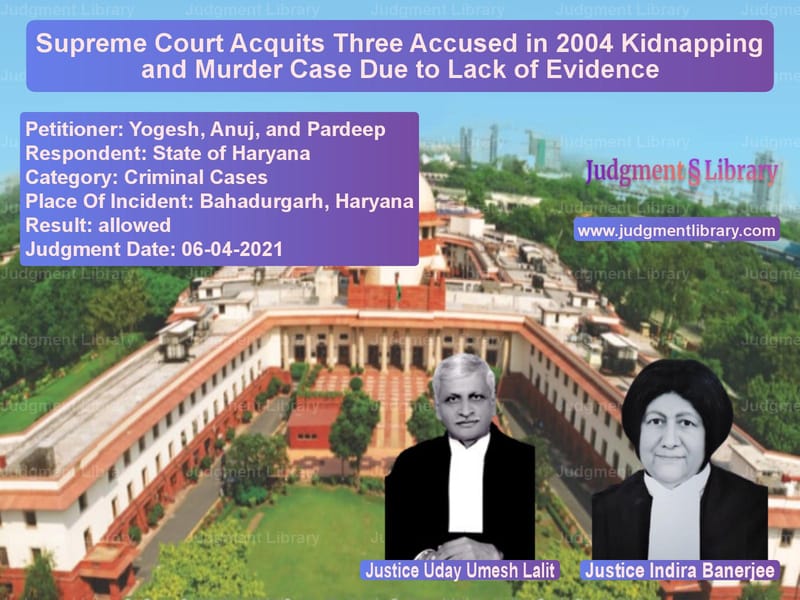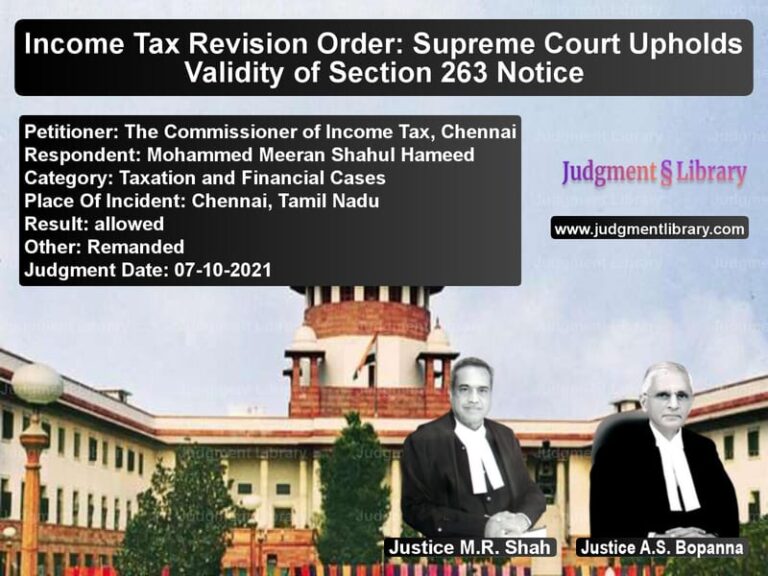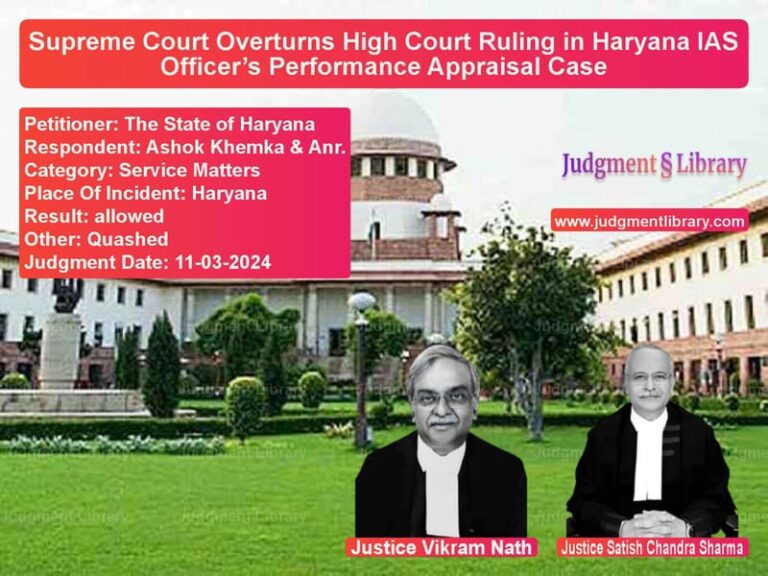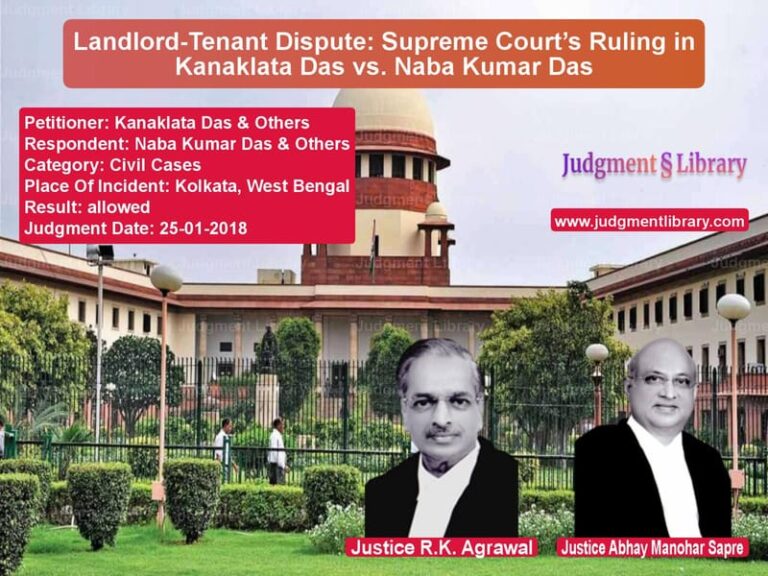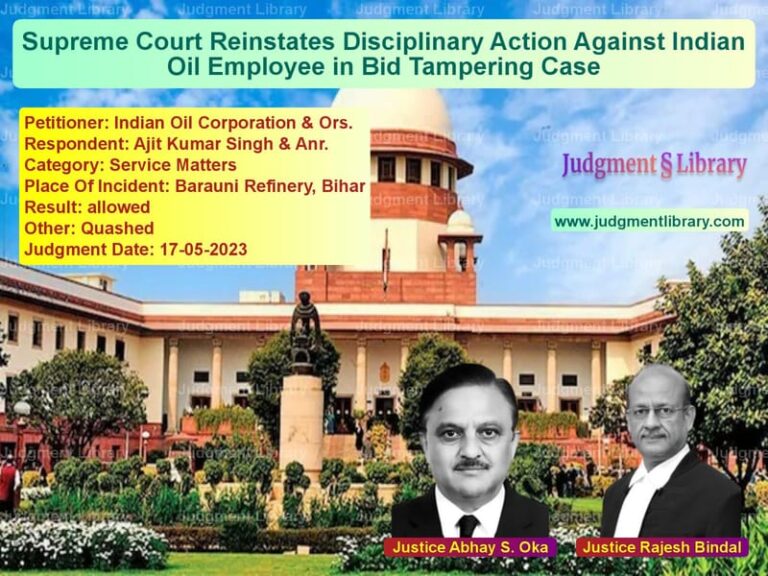Supreme Court Acquits Three Accused in 2004 Kidnapping and Murder Case Due to Lack of Evidence
The Supreme Court of India recently acquitted three individuals—Yogesh, Anuj, and Pardeep—who had been convicted in a 2004 case involving the kidnapping and murder of a minor girl. The Court ruled that the prosecution had failed to prove its case beyond a reasonable doubt, emphasizing the importance of fair trial principles and the high evidentiary threshold required in cases relying on circumstantial evidence.
Background of the Case
The case began on August 18, 2004, when an FIR was registered at Police Station City, Bahadurgarh, Haryana, concerning the kidnapping of a minor girl who was forcibly taken away on a motorcycle by two men while she was returning home from school. Witnesses claimed that the accused took her against her will, and her father later reported the crime to the police.
Read also: https://judgmentlibrary.com/supreme-court-upholds-conviction-in-tamil-nadu-custodial-death-case/
Two days later, the victim’s body was recovered in a field. The post-mortem report indicated that she had been sexually assaulted, manually strangled, and smothered. Subsequently, eight people, including the three appellants, were arrested and charged under various sections of the Indian Penal Code (IPC), including Sections 302 (murder), 364-A (kidnapping for ransom), 376 (rape), and 120B (criminal conspiracy).
The trial court convicted four of the accused, including the three appellants, while acquitting the remaining individuals. The High Court later upheld the conviction, leading to the present appeal before the Supreme Court.
Petitioner’s Arguments (Yogesh, Anuj, and Pardeep)
- The appellants argued that the case against them was based entirely on circumstantial evidence, which did not establish their guilt beyond a reasonable doubt.
- They pointed out that key prosecution witnesses, including the victim’s brother and uncle, had turned hostile and did not support the case against them.
- The appellants contended that there was no direct evidence linking them to the crime, and the prosecution relied on unreliable and contradictory statements.
- They challenged the authenticity of the alleged recoveries of evidence, arguing that they were not conclusively linked to the accused.
Respondent’s Arguments (State of Haryana)
- The prosecution asserted that the victim’s father had identified the accused as those who kidnapped his daughter.
- It relied on the alleged recoveries of the victim’s belongings, which were claimed to have been found in the possession of the accused.
- The prosecution argued that the conviction was based on strong circumstantial evidence and that the accused were guilty of a heinous crime.
Supreme Court’s Analysis and Judgment
The Supreme Court conducted a detailed examination of the evidence and found significant inconsistencies in the prosecution’s case. The key observations made by the Court included:
- “The prosecution must prove its case beyond reasonable doubt. Mere suspicion, however strong, cannot substitute for legal proof.”
- “In cases based on circumstantial evidence, the chain of evidence must be so complete that it leaves no reasonable ground for any alternative hypothesis.”
- “The testimonies of key witnesses, including the victim’s brother and uncle, did not support the prosecution’s case.”
- “The recovery of evidence was not satisfactorily proven to be linked with the accused.”
The Court ruled that the prosecution failed to establish guilt beyond a reasonable doubt and, therefore, the conviction could not be sustained. Accordingly, the Supreme Court set aside the conviction of the three accused and ordered their immediate release.
Key Legal Principles Reinforced by the Judgment
- Burden of Proof: The ruling reaffirmed that in criminal cases, the burden of proof lies squarely on the prosecution, which must prove guilt beyond reasonable doubt.
- Circumstantial Evidence: The Court reiterated that circumstantial evidence must form a complete chain leading to the inevitable conclusion of guilt, excluding any other reasonable hypothesis.
- Role of Hostile Witnesses: The case highlighted the importance of reliable witness testimonies and the impact of key witnesses turning hostile.
Impact of the Judgment
This judgment underscores the necessity of ensuring fair trials and the protection of the rights of the accused. The ruling is expected to have significant implications in cases where convictions are based solely on circumstantial evidence.
For law enforcement, the judgment serves as a reminder of the importance of conducting thorough and evidence-backed investigations before filing charges. For the judiciary, it emphasizes the need to critically examine prosecution claims, especially in cases where crucial witnesses turn hostile.
Read also: https://judgmentlibrary.com/mukhtar-ansaris-custody-supreme-court-orders-transfer-to-uttar-pradesh/
Conclusion
The Supreme Court’s verdict in Yogesh & Ors. v. State of Haryana highlights the importance of due process and the principle that no person should be convicted unless their guilt is proven beyond a reasonable doubt. By acquitting the accused due to lack of conclusive evidence, the Court has reinforced the judiciary’s role in upholding justice and preventing wrongful convictions.
Petitioner Name: Yogesh, Anuj, and Pardeep.Respondent Name: State of Haryana.Judgment By: Justice Uday Umesh Lalit, Justice Indira Banerjee.Place Of Incident: Bahadurgarh, Haryana.Judgment Date: 06-04-2021.
Don’t miss out on the full details! Download the complete judgment in PDF format below and gain valuable insights instantly!
Download Judgment: yogesh,-anuj,-and-pa-vs-state-of-haryana-supreme-court-of-india-judgment-dated-06-04-2021.pdf
Directly Download Judgment: Directly download this Judgment
See all petitions in Murder Cases
See all petitions in Bail and Anticipatory Bail
See all petitions in Judgment by Uday Umesh Lalit
See all petitions in Judgment by Indira Banerjee
See all petitions in allowed
See all petitions in supreme court of India judgments April 2021
See all petitions in 2021 judgments
See all posts in Criminal Cases Category
See all allowed petitions in Criminal Cases Category
See all Dismissed petitions in Criminal Cases Category
See all partially allowed petitions in Criminal Cases Category

